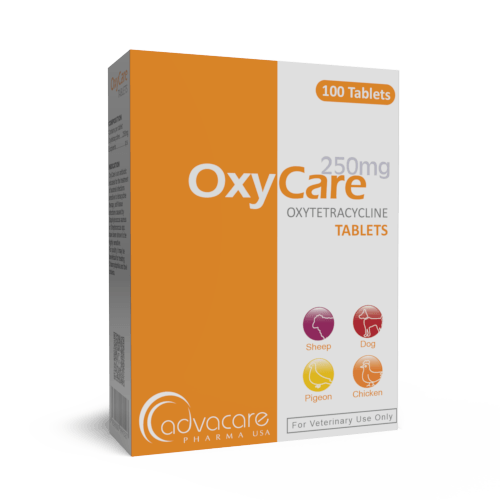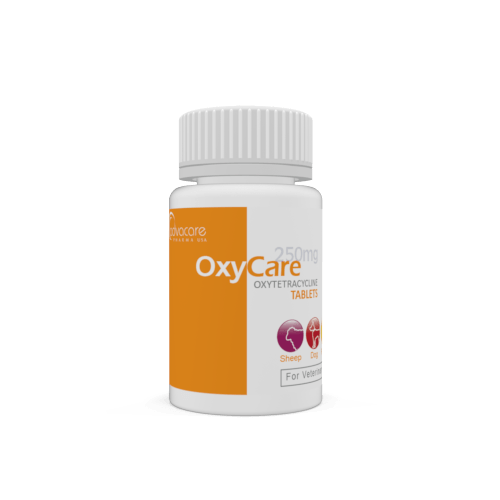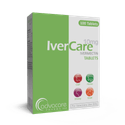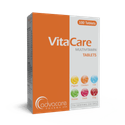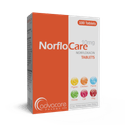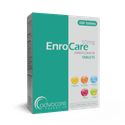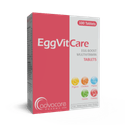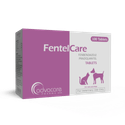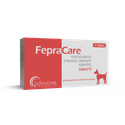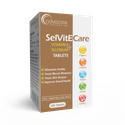- Home›
- Veterinary Pharmaceuticals›
- Veterinary Tablets›
- Oxytetracycline Tablets
Oxytetracycline Tablets
Dosage
Packaging
What is Oxytetracycline?
Active Ingredients: Oxytetracycline
Oxytetracycline Tablets are an antibiotic drug used to treat a wide variety of bacterial and protozoal diseases in ornamental birds and poultry. Oxytetracycline is effective against the bacteria that infect the eyes, oral cavity, bones, respiratory tract, sinuses, and blood cells in animals. But its efficacy also depends on the present bacteria.This antibiotic is effective for most bacteria except for resistant gram-positive bacilli of Staphylococci.
Oral treatments of Oxytetracycline are typically given to smaller animals, like dogs and cats, but may be used to treat larger animals like horses or pigs.
Oxytetracycline, a broad-spectrum antibiotic from the tetracycline family, is derived from the fermented product of Streptomyces rimosus. Its efficiency is shown by inhibiting protein synthesis in bacteria, demonstrating efficacy against both gram-positive and gram-negative bacteria. This includes pathogens like Mycoplasma pneumoniae, Diplococcus pneumoniae, and Escherichia coli. Its activity extends to Chlamydia, Rickettsia, and spirochetes.
Following oral administration, the antibiotic is absorbed in the upper small intestine and subsequently distributed in the bloodstream within 2-4 hours. The absorption process is influenced by factors such as sodium bicarbonate, aluminum hydroxide, calcium, iron, and dairy products. Oxytetracycline exhibits good oral bioavailability in dogs but poor bioavailability in horses.
The antibiotic rapidly permeates the entire body, reaching high concentrations in various tissues and fluids, including the kidneys, liver, spleen, bone, bile, and lungs. However, the absorption of drugs can depend on many factors such as the specific drug's properties, formulation, and the individual animal. Biotransformation in domestic animals is limited, and the drug is excreted without alteration. Excretion occurs through both glomerular filtration and the gastrointestinal tract, with the process influenced by factors such as the animal's age, route of administration, renal health, urine pH, and glomerular filtration rate.
Regardless of the administration method or form chosen, Oxytetracycline is widely distributed and sequestered in the animal's body, particularly in the liver, kidney, bone, and dentine. Tetracyclines undergo minimal metabolism in animals, and the drug is excreted unchanged through urine. It is recommended to conduct blood tests and urinalysis before initiating antibiotic treatment rather than during the treatment period.
This antibiotic is also available as bolus, injection, premix, and soluble powder. The chosen form depends on the veterinarian and the current health condition of the animal.
It is important to note that this formulation of Oxytetracycline is for veterinary purposes only.
AdvaCare Pharma is a trusted global producer and exporter of Oxytetracycline Tablets. This veterinary medication is manufactured under strict GMP regulations in our facilities in China, India, and the USA.
Why choose us as your Oxytetracycline manufacturer?
Oxytetracycline Tablets, manufactured and globally supplied by AdvaCare Pharma, are one of our 250+ veterinary medicines. From supply chain coordination to product registration support, our professional teams of specialists and experts provide our veterinary distributors unparalleled support. As a trusted Oxytetracycline manufacturer, veterinarians and farmers alike rely on our high-quality veterinary tablets manufactured according to GMP standards.
Uses
What is Oxytetracycline used for?
It's used to treat infections such as:
- bacterial enteritis
- salmon poisoning
- Mycoplasma infections
What animals can be treated with Oxytetracycline Tablets?
It's recommended for cats, dogs, poultry, and ornamental birds, including chickens, geese, pigeons, parrots, and canaries.
What are the most common diseases treated with Oxytetracycline Tablets?
The diseases commonly treated with Oxytetracycline vary based on the animal species. In cattle, it is primarily employed against Pasteurella multocida, Mannheimia haemolytica, and Histophilus somni. For pigs, it is utilized to combat Mycoplasma infections, pneumonic pasteurellosis, and atrophic rhinitis. In companion animals, it is often employed for Rickettsia spp. and Ehrlichia spp. infections. In horses, Oxytetracycline is applied to manage equine piroplasmosis caused by Theileria equi, Potomac fever induced by Neorickettsia risticii, as well as various respiratory and soft tissue infections.
How does Oxytetracycline help in treating salmon poisoning?
Animals consuming raw food, particularly uncooked salmon, face an elevated risk of developing salmon poisoning attributed to the parasite Nanophyetus salmincola. Clinical signs include vomiting, fever, decreased appetite, weakness, diarrhea, swollen lymph nodes, and dehydration. A combination of Oxytetracycline and supplementation can enhance the health of afflicted animals.
How does Oxytetracycline help in managing Mycoplasma infections?
Mycoplasma infections are prevalent in dogs with compromised immune systems and those housed in kennels. These infections, caused by gram-negative bacteria lacking a cell wall, can lead to gastrointestinal, respiratory, and reproductive complications. In companion animals, kennel cough is a common manifestation, causing severe respiratory issues and elevating the risk of secondary infections. Oxytetracycline, being effective against bacteria that lack a cell wall, serves as the optimal treatment for Mycoplasma infections, necessitating administration for up to two weeks.
How are Oxytetracycline Tablets used?
This medicine has been manufactured as a tablet, which is intended to be given orally to an animal.
How should Oxytetracycline Tablets be stored?
This medication should be stored in a dark, dry location under 30°C. Keep the tablets in the blister pack when not in use.
Is there a withdrawal period after treatment with Oxytetracycline?
The exact duration will depend on local regulations.
Dosage
How much Oxytetracycline should be given to poultry?
The usual dose is 5mg per kg of body weight.
The dosage depends on the animal’s current health condition. The veterinarian should examine the animal before determining the dose. The dose also depends on the age and body weight of the animal.
Refer to a veterinary doctor or pharmacist for guidelines on dosage.
Side Effects
As with all pharmaceuticals, some unwanted effects can occur from the use of Oxytetracycline Tablets.
The most common side effects of Oxytetracyclines may include but are not limited to:
- gastrointestinal effects (upset stomach, nausea, diarrhea)
- sensitivity to sunlight
- rash
- allergic reaction
Excessive oral doses may lead to a reduction in microflora or ruminoreticular stasis in ruminants.
The administration of tetracycline antibiotics in animals may result in superinfections caused by fungi, yeast, and resistant bacteria.
Gastrointestinal disturbances may occur in critically ill animals following oral consumption. The most common symptoms of gastrointestinal disturbances are vomiting, diarrhea, and constipation. Allergic reactions include itching, difficulty breathing, and swollen parts of the animal’s body. As soon as you notice these side effects, seek for help from a professional.
Higher-than-recommended dosages of the antibiotic may induce neuromuscular blocking effects.
Tetracyclines are not advisable for treating animals with botulism as they already have neuromuscular blockage, and administering tetracyclines could exacerbate their health condition.
Oxytetracycline has the potential to chelate calcium in teeth and bones, leading to yellow or brown discoloration. Excessive and frequent dosages can result in the fracture of the animal’s teeth.
Animals with liver issues should undergo examination before receiving oxytetracycline due to potential hepatotoxic effects, particularly in pregnant animals where the mortality rate is high.
Renal insufficiency in animals may lead to nephrotoxic effects when oxytetracycline is administered.
For a comprehensive list of all potential side effects of this medication, it is advisable to consult a veterinarian.
Precautions
Do NOT use Oxytetracycline Tablets for an animal that:
- has a known allergy or hypersensitivity to any of the ingredients.
- has a known allergy or hypersensitivity to other tetracyclines.
Treatment with this drug should be administered with caution for an animal that:
- is pregnant.
- has chronic gastrointestinal issues.
- is lactating.
- has renal insufficiencies.
This medication has the potential to generate inaccurate readings of urine catecholamines and may lead to a false-positive result for urine glucose when employing Benedict's reagent.
Additionally, as the drug is excreted through feces, it may not be the most suitable option for patients dealing with chronic gastrointestinal issues.
Oxytetracycline should not be given to pregnant and lactating animals. This is because the drug is excreted through milk, and residual traces of the medication can persist for up to 48 hours.
Before prescribing oxytetracycline, it is advisable for a veterinarian to assess patients with a chronic kidney disease. Given that biotransformation and excretion primarily occur in the kidneys, patients with kidney diseases typically exhibit low glomerular filtration.
The effectiveness and absorption of tetracycline may diminish when taken in conjunction with dairy products. Moreover, the activity of this antibiotic can be compromised if it is diluted in fluids, and exposed to ultraviolet light.
What are the most common animals Oxytetracycline Tablets are used for?
Oxytetracycline tablets are primarily used for treating bacterial infections in animals and livestock. The specific common uses of oxytetracycline tablets include treatment of the following diseases:
- Pasteurella multocida
- Mycoplasma infections
- Pneumonic pasteurellosis
- Histophilus somni
- Rickettsia spp.
- Ehrlichia spp.
- Fowl Cholera
- Atrophic rhinitis
- Equine piroplasmosis
- Respiratory infections
- Soft tissue infections
- Ehrlichia spp.
- Mycoplasma gallisepticum
- Chronic Respiratory Disease (CRD)
- Infectious Coryza
- Mannheimia haemolytica
- Potomac fever
Poultry Bacterial Infections
Oxytetracycline is used for treating serious bacterial infections in poultry. This includes treating Mycoplasma infections caused by susceptible bacteria in the respiratory tract. Avibacterium paragallinarum can also be treated with oxytetracycline. Pasteurella multocida or Fowl Cholera can be treated with antibiotics and a combination of supplementations for poultry. Oxytetracycline is effective against many enteric infections.
Companion Animals Bacterial Infections
Oxytetracycline in companion animals is an effective antibiotic against many respiratory, skin, gastrointestinal, and urine infections. Tick-borne disease or Lyme disease can also be cured with this antibiotic. Chlamydial infections, especially in cats, are treated with oxytetracycline.
The antibiotic choice and form of antibiotic depends on the diagnosis from the veterinarian. The veterinarian decides about the prescription of this drug in animals based on the current health condition. In some cases, a combination of other antibiotics and supplements is needed for complete treatment.

You might be interested in...
Why AdvaCare Pharma?
As an industry leader, we are aware of our responsibility to provide affordable and sustainable solutions to improve healthcare worldwide.
